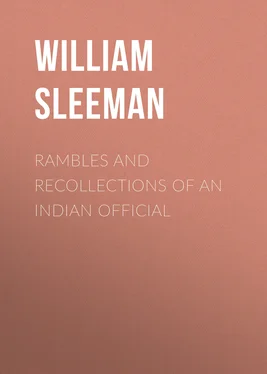William Sleeman - Rambles and Recollections of an Indian Official
Здесь есть возможность читать онлайн «William Sleeman - Rambles and Recollections of an Indian Official» — ознакомительный отрывок электронной книги совершенно бесплатно, а после прочтения отрывка купить полную версию. В некоторых случаях можно слушать аудио, скачать через торрент в формате fb2 и присутствует краткое содержание. Жанр: Путешествия и география, История, foreign_edu, foreign_antique, foreign_prose, на английском языке. Описание произведения, (предисловие) а так же отзывы посетителей доступны на портале библиотеки ЛибКат.
- Название:Rambles and Recollections of an Indian Official
- Автор:
- Жанр:
- Год:неизвестен
- ISBN:нет данных
- Рейтинг книги:4 / 5. Голосов: 1
-
Избранное:Добавить в избранное
- Отзывы:
-
Ваша оценка:
- 80
- 1
- 2
- 3
- 4
- 5
Rambles and Recollections of an Indian Official: краткое содержание, описание и аннотация
Предлагаем к чтению аннотацию, описание, краткое содержание или предисловие (зависит от того, что написал сам автор книги «Rambles and Recollections of an Indian Official»). Если вы не нашли необходимую информацию о книге — напишите в комментариях, мы постараемся отыскать её.
Rambles and Recollections of an Indian Official — читать онлайн ознакомительный отрывок
Ниже представлен текст книги, разбитый по страницам. Система сохранения места последней прочитанной страницы, позволяет с удобством читать онлайн бесплатно книгу «Rambles and Recollections of an Indian Official», без необходимости каждый раз заново искать на чём Вы остановились. Поставьте закладку, и сможете в любой момент перейти на страницу, на которой закончили чтение.
Интервал:
Закладка:
A few days after this conversation with the Principal of the Jubbulpore College, I had a visit from Bholī Sukul, the present head of the Sihōrā banker's family, and youngest brother of the Brahman with whose ashes the Lodhī woman burned herself. I requested him to tell me all that he recollected about this singular suttee, and he did so as follows:
'When my eldest brother, the father of the late Dulī Sukul, who was so long a native collector under you in this district, died about twenty years ago at Sihōrā, a Lodhī woman, who resided two miles distant in the village of Khitolī, which has been held by our family for several generations, declared that she would burn herself with him on the funeral pile; that she had been his wife in three different births, had already burnt herself with him three times, and had to burn with him four times more. She was then sixty years of age, and had a husband living [of] about the same age. We were all astounded when she came forward with this story, and told her that it must be a mistake, as we were Brahmans, while she was a Lodhī. She said that there was no mistake in the matter; that she, in the last birth, resided with my brother in the sacred city of Benares, and one day gave a holy man who came to ask charity salt, by mistake, instead of sugar, with his food. That, in consequence, he told her she should, in the next birth, be separated from her husband, and be of inferior caste; but that, if she did her duty well in that state, she should be reunited to him in the following birth. We told her that all this must be a dream, and the widow of my brother insisted that, if she were not allowed to burn herself, the other should not be allowed to take her place. We prevented the widow from ascending the pile, and she died at a good old age only two years ago at Sihōrā. My brother's body was burned at Sihōrā, and the poor Lodhī woman came and stole one handful of the ashes, which she placed in her bosom, and took back with her to Khitolī. There she prevailed upon her husband and her brother to assist her in her return to her former husband and caste as a Brahman. No soul else would assist them, as we got the then native chief to prohibit it; and these three persons brought on their own heads the pile, on which she seated herself, with the ashes in her bosom. The husband and his brother set fire to the pile, and she was burned.' 68 68 This version of the story differs in some minute particulars from the version given ante , [14].
'And what is now your opinion, after a lapse of twenty years?'
'Why, that she had really been the wife of my brother; for at the pile she prophesied that my nephew Dulī should be, what his grandfather had been, high in the service of the Government, and, as you know, he soon after became so.'
'And what did your father think?'
'He was so satisfied that she had been the wife of his eldest son in a former birth, that he defrayed all the expenses of her funeral ceremonies, and had them all observed with as much magnificence as those of any member of the family. Her tomb is still to be seen at Khitolī, and that of my brother at Sihōrā.'
I went to look at these tombs with Bholī Sukul himself some short time after this conversation, and found that all the people of the town of Sihōrā and village of Khitolī really believed that the old Lodhī woman had been his brother's wife in a former birth, and had now burned herself as his widow for the fourth time. Her tomb is at Khitolī, and his at Sihōrā.
CHAPTER 5
Before quitting Jubbulpore, to which place I thought it very unlikely that I should ever return, I went to visit the groves in the vicinity, which, at the time I held the civil charge of the district in 1828, had been planted by different native gentlemen upon lands assigned to them rent-free for the purpose, on condition that the holder should bind himself to plant trees at the rate of twenty-five to the acre, and keep them up at that rate; and that for each grove, however small, he should build and keep in repair a well, lined with masonry, for watering the trees, and for the benefit of travellers. 69 69 In planting mango groves, it is a rule that they shall be as far from each other as not to admit of their branches ever meeting. 'Plant trees, but let them not touch' ('Ām lagao, nis lageñ nahīñ ') is the maxim. [W. H. S.]
Some of these groves had already begun to yield fruit, and all had been married . Among the Hindoos, neither the man who plants a grove, nor his wife, can taste of the fruit till he has married one of the mango-trees to some other tree (commonly the tamarind-tree) that grows near it in the same grove. The proprietor of one of these groves that stands between the cantonment and the town, old Barjōr Singh, had spent so much in planting and watering the grove, and building walls and wells of pucka 70 70 Pakkā ; the word here means 'cemented with lime mortar', and not only with mud ( kachchā ).
masonry, that he could not afford to defray the expense of the marriage ceremonies till one of the trees, which was older than the rest when planted, began to bear fruit in 1833, and poor old Barjōr Singh and his wife were in great distress that they dared not taste of the fruit whose flavour was so much prized by their children. They began to think that they had neglected a serious duty, and might, in consequence, be taken off before another season could come round. They therefore sold all their silver and gold ornaments, and borrowed all they could; and before the next season the grove was married with all due pomp and ceremony, to the great delight of the old pair, who tasted of the fruit in June 1834.
The larger the number of the Brahmans that are fed on the occasion of the marriage, the greater the glory of the proprietor of the grove; and when I asked old Barjōr Singh, during my visit to his grove, how many he had feasted, he said, with a heavy sigh, that he had been able to feast only one hundred and fifty. He showed me the mango-tree which had acted the part of the bridegroom on the occasion, but the bride had disappeared from his side. 'And where is the bride, the tamarind?' 'The only tamarind I had in the grove died', said the old man, 'before we could bring about the wedding; and I was obliged to get a jasmine for a wife for my mango. I planted it here, so that we might, as required, cover both bride and bridegroom under one canopy during the ceremonies; but, after the marriage was over, the gardener neglected her, and she pined away and died.'
'And what made you prefer the jasmine to all other trees after the tamarind?'
'Because it is the most celebrated of all trees, save the rose.'
'And why not have chosen the rose for a wife?'
'Because no one ever heard of marriage between the rose and the mango; while they [ sic ] take place every day between the mango and the chambēlī (jasmine).' 71 71 The chambēlī is known in science as the Jasminum grandiflorum , and the mango-tree as Mangifera Indica .
After returning from the groves, I had a visit after breakfast from a learned Muhammadan, now guardian to the young Rājā of Uchahara, 72 72 A small principality west of Rīwā, and 110 miles north-west of Jubbulpore. It is also known as Nāgaudh, or Nāgod.
who resides part of his time at Jubbulpore. I mentioned my visit to the groves and the curious notion of the Hindoos regarding the necessity of marrying them; and he told me that, among Hindoos, the man who went to the expense of making a tank dared not drink of its waters till he had married his tank to some banana-tree, planted on the bank for the purpose. 73 73 Compare the account of the marriage of the tulasī shrub ( Ocymum sanctum ) with the sālagrām stone, or fossil ammonite, in Chapter 19, post .
Интервал:
Закладка:
Похожие книги на «Rambles and Recollections of an Indian Official»
Представляем Вашему вниманию похожие книги на «Rambles and Recollections of an Indian Official» списком для выбора. Мы отобрали схожую по названию и смыслу литературу в надежде предоставить читателям больше вариантов отыскать новые, интересные, ещё непрочитанные произведения.
Обсуждение, отзывы о книге «Rambles and Recollections of an Indian Official» и просто собственные мнения читателей. Оставьте ваши комментарии, напишите, что Вы думаете о произведении, его смысле или главных героях. Укажите что конкретно понравилось, а что нет, и почему Вы так считаете.












